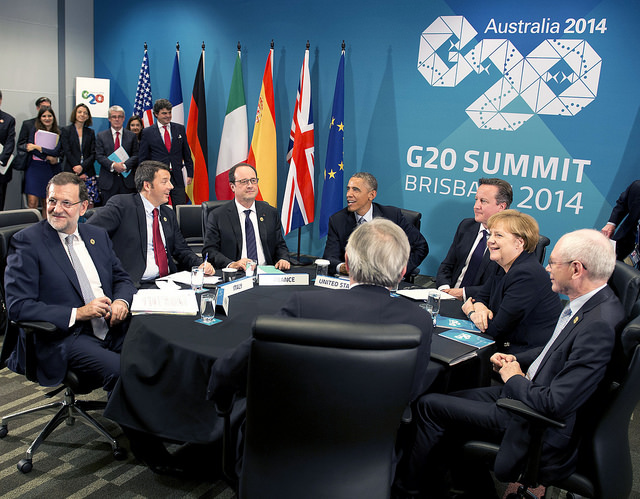
Boosting the World’s Economy Needs Action, Notably From Europe—Not Another Predictable Summit Communique
National leaders of the Group of Twenty met in Brisbane, Australia over the weekend to deliver an action plan for global economic growth and employment. Topping the agenda were items such as boosting job growth, investment to renew infrastructure , and improving the participation of minorities, immigrants, and women in the labor market. Yet, historically speaking, these meetings rarely result in actual progress or follow-through, unless there is a clear urgency.
Australian Prime Minister Tony Abbott, who hosted the two-day meeting, made an effort to find common ground for discussion and put forth a bold target: to achieve a collective, cumulative, 2 percent in additional growth for all G20 economies by 2018. (That is, 2 percent growth beyond a baseline scenario that was defined in October 2013.)
This lofty goal has all the world pointing fingers at Europe. With European countries representing nearly 30 percent of the Group of Twenty’s collective GDP, achieving the goal is simply impossible unless European economies make a fresh start, with new ideas to jumpstart growth. So, the “old continent” and its weakly executed agenda remain at the core of the discussion.
European governments must stop thinking in the short term. European leaders now should focus on long-term policies to raise productivity, create more skilled workforces, provide better access to financing, develop incentives to foster small- and medium-sized enterprises, and implement Europe-wide innovation measures. These are among the most important steps to avoid further European stagnation and propel the continent forward.
A more straightforward decision-making process at the Brussels level, and firmer execution of those decisions at a national level are necessary as well.
In Brussels, the new European Commission should prove to be efficient enough to overcome vetoes from major economies and come out with smart and concrete ideas. In the capitals, ministers should spend more time with their bureaucracies and act as CEOs to get innovations implemented. Setting targets and asking for delivery on those targets should be center-stage priorities for them. To ensure actual progress, these leaders should also hold each other accountable for falling short on reaching these benchmarks.
All in all, European leaders did not need to meet in Brisbane to come out with yet another list of agenda items and an uninventive communique that merely reaffirms their existing commitments. They simply need to deliver soon.
Andrea Montanino is the director of the Atlantic Council’s Global Business and Economics Program.
Image: Seven European leaders--from Spain, Italy, France, the UK, Germany, the European Union and European Commission--meet President Obama during the G20 Summit in Australia, November 16. (Palazzo Chigi/CC License)
